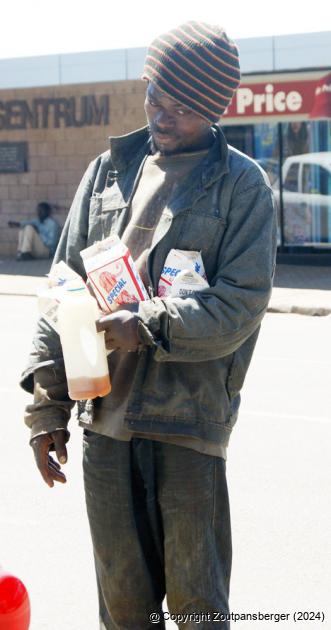

ADVERTISEMENT:

He drinks Special sorghum beer and petrol.
“Giving money to beggars not a solution ...”
Date: 27 February 2015 By: Tshifhiwa Mukwevho
Many motorists have by now become used to the dirty and semi-drunk beggar that frequents Louis Trichardt's main streets. Some give him money just to get him to go away, but others refuse to give him anything because they believe he will use it to buy more liquor and become intoxicated.
The man, who must be in his 30s, walks the streets of town, carrying open pints of Leopard sorghum beer, tins of glue and a litre bottle of petrol (sometimes diesel). He consumes all those substances while begging for money from motorists. He has become a well-known face, but he is not popular among all the people.
“I am afraid of him when he comes to my open window when I am parking,” says a female motorist. “I just give him money to shoo him away.”
Most motorists said that he gives them the fright of their life, because he just appears as if from nowhere at their windows. He dresses in a pair of dirty jeans, a denim jacket and he wears a woollen beanie. He walks the streets barefoot.
On several occasions he was spotted while patrolling the parking areas in town. After a while he becomes so intoxicated that he collapses on the busy road or pavements and doses off. Once he wakes up, he continues his habit.
“When I see him walking in my direction, I turn around and follow another route,” a Grade 5 learner, Lufuno Sinthumule, said. “People say he is harmless, but I don't believe it. He looks dangerous! He looks at me with his bloodshot eyes, sniffing his glue.”
Three weeks ago a group of hawkers caned him severely and lacerated his back, bottom and head, after he had allegedly broken into seven shacks. He allegedly stole property such as a gas cylinder and pots. “He is a nuisance of a man,” said a vendor, who sells pap and vleis.
It is not clear where he comes from. He speaks a mixture of broken Nguni and Sotho. WhenLimpopo Mirror tried to speak to him, he just stretched out his hand and said: “Awungiphe(Give me).” He wanted money.
The spokesperson for the Makhado police, Const Irene Radzilane, said it was not for the police to decide whether people must or must not give him money. “From our side, if he is sniffing glue, drinking alcohol in public places or troubling people, then members of the community should notify us,” Radzilane said.
A social worker in private practice, Bridget Mugivhi-Ramaite, says it is human and commendable to be concerned about the welfare of other people. She adds that giving money to beggars is not a solution to their plight, because the underlying causes that led to them begging are not addressed.
“Some of the beggars abuse alcohol and drugs and if they struggle to get the money to feed their addiction, they may engage in criminal activities,” she says.
Mugivhi-Ramaite says that, as a temporary measure, people can buy beggars food instead of giving them money which may be spent on alcohol or drugs. “As a permanent measure, kindly donate money to charity organisations that will properly assess the plight of the destitute and provide the relevant intervention that will foster a sense of purpose, self-respect and hopefulness,” she said.
Viewed: 1461
|
|
Tweet |

-

Yahya selected for SA over-50s World Cup
26 April 2024 By Anton van Zyl -

Wetteloosheid op paaie wys die krake in plaaslike wetstoepassing
25 April 2024 By Andries van Zyl -

Bestuurder hardloop weg na hy deur heining bars
25 April 2024 By Karla van Zyl -

Soutpansberg athletes conquer Two Oceans Ultra Martahon
25 April 2024 By Karla van Zyl -

MMSEZ now also looking at nuclear power
19 April 2024 By Andries van Zyl

Tshifhiwa Mukwevho
Tshifhiwa Given Mukwevho was born in 1984 in Madombidzha village, not far from Louis Trichardt in the Limpopo Province. After submitting articles for roughly a year for Limpopo Mirror's youth supplement, Makoya, he started writing for the main newspaper. He is a prolific writer who published his first book, titled A Traumatic Revenge in 2011. It focusses on life on the street and how to survive amidst poverty. His second book titled The Violent Gestures of Life was published in 2014.

More photos...

ADVERTISEMENT


-

Former Triegie’s acting career taking off
12 April 2024 By Karla van Zyl -

Local para-athletes shine at SA Champs
05 April 2024 -

MMSEZ now also looking at nuclear power
19 April 2024 By Andries van Zyl -

Epic finish for local cycling duo
29 March 2024 By Andries van Zyl -

Debt-collection company apologises for rude letter
29 March 2024 By Anton van Zyl

ADVERTISEMENT:


ADVERTISEMENT


